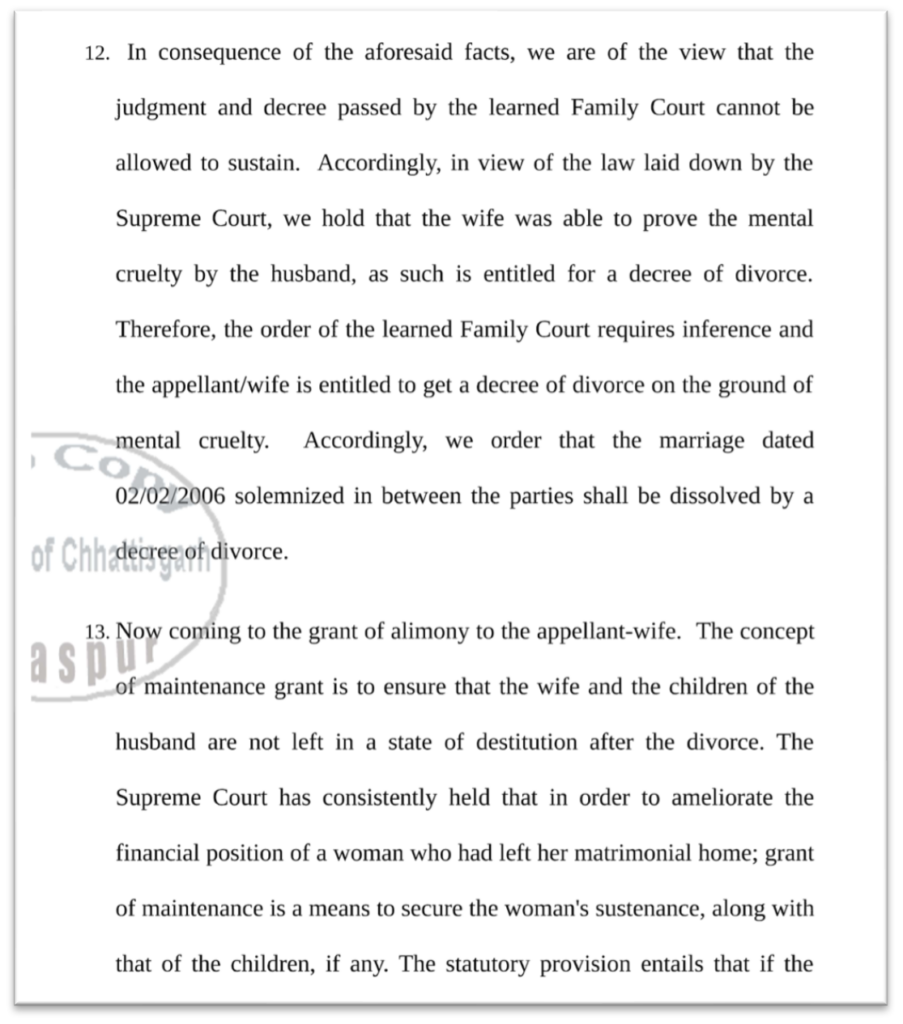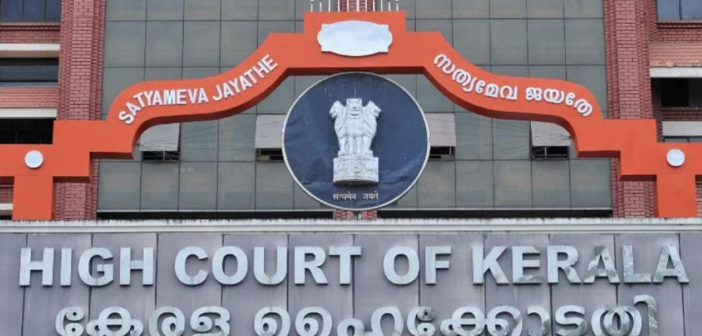In this week’s review of Court Judgments, we look at Supreme Court’s observation highlighting the importance of eyewitness account, Delhi High Court declining UPSC aspirant’s plea to appear in exam, Allahabad High Court’s observation that an earning spouse is responsible to protect life, liberty & dignity of other as long as marriage survives, Chhattisgarh High Court’s judgment regarding a divorce case and Kerala High Court’s judgment in respect to an appeal regarding granting legal heirship in case of missing person.
Supreme Court: Eyewitness account can’t be discarded merely because of inconsistencies with medical evidence.
The Supreme Court bench comprising Justices Aniruddha Bose and Justice Bela M Trivedi was hearing an appeal in the case Rameshji Amarsingh Thakor vs. State of Gujarat. The appeal was against a Gujarat High Court judgment that had overturned the acquittal by the trial court.
The appellant in this case was convicted under Section 302 of IPC for the murder of one Jayanthibhai on 10 July 1995. In the brutal killing of Jayanthi bhai, he succumbed to knife injuries during the incident. An FIR was lodged by the brother of the deceased alleging that the appellant committed the murder along with his father and brother.
The prosecution based its case on the eyewitness of the prosecution witness and the dying declaration of other witnesses. However, the trial court acquitted all the 3 accused based on medical evidence.
However, the High Court reversed the acquittal and held the appellant liable. Hence the appellants approached the Supreme Court. The defence on behalf of the appellants referred to the trial court’s observation which noted discrepancies in the manner in which the knife blows were allegedly inflicted, and the identification of the weapon used. The contention was that as per the medical evidence presented during the trial, the knife seized as evidence could not have caused the fatal injury sustained by the deceased.
However, the Court pointed out that the trial court had placed undue emphasis on relatively minor contradictions in witness statements, ignoring the overall testimony of the prosecution witness. It noted that the statement of the witness should not be entirely negated merely because as per the opinion of the autopsy surgeon, the fatal injuries could not be caused by the recovered knife.
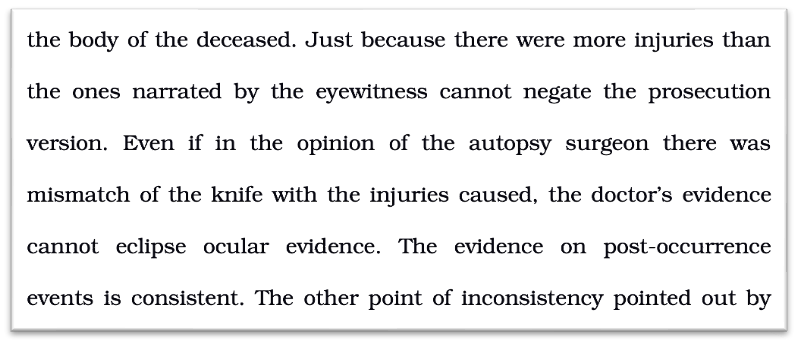
The Court referred to the judgment in State of H. P. vs. Lekh Raj (2000) which emphasized that it was common for different witnesses to provide slightly varying accounts of details. The Court noted that unless these contradictions were of substantial significance, they should not be used to reject the entire body of evidence.
The Court relied on Darbara Singh vs. State of Punjab (2012) and Anvaruddin vs. Shakoor 1990 to emphasize the importance of ocular evidence over the opinion of medical experts.
On the aspect of discrepancies, the Court stated that there are bound to be some discrepancies between the narrations of different witnesses when they speak on details, and unless the contradictions are of a material dimension, the same should not be used to jettison the evidence in its entirety. It emphasized that the evidence provided by eyewitnesses and post-occurrence witnesses was consistent and sufficiently corroborated the prosecution’s account of events.
Hence, the Supreme Court upheld the conviction and dismissed the appeal. The Court highlighted the need to avoid undue reliance on fanciful doubts when considering the rule of the benefit of the doubt.
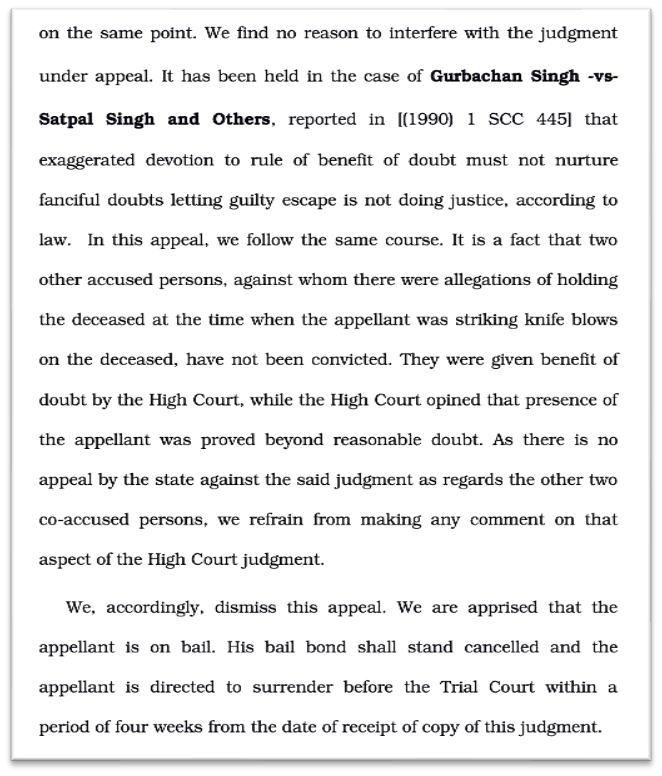
Allahabad HC: Earning spouse has a duty to protect life, liberty & dignity of other as long as marriage survives
In the case Santosh Kumar vs. Gayatri Devi, the Allahabad High Court observed that as long as the marriage survives, it remains the duty of the earning spouse to protect the life, liberty, and dignity of the other.
The bench comprising Justice Saumitra Dayal Singh and Justice Rajendra Kumar was hearing an appeal filed by one Santosh Kumar, challenging an order passed by the Family court under Section 24 of the Hindu Marriage Act, 1955, to provide Rs. 7 thousand per month as interim maintenance to his wife.
The contention of the appellant was that his salary was Rs. 16,500 currently, and earlier it was about Rs. 15,470. Therefore, it was unreasonable of the court to award the maintenance amount of Rs. 7,000 per month.
The court considered the same, and also in view of the fact that there were no children born from the marriage, it felt that the family court had erred by awarding nearly 50% of the total monthly income of the appellant, towards interim maintenance.
However, the court also added that certain minimum amounts have to be provided to ensure the protection of life, liberty, and dignity of the spouse of the appellant involved in an estranged marriage situation. The Court was of the view that the amount of Rs. 5,000 per month towards interim maintenance to the wife from the date of her filing of application would be sufficient to protect the interest of justice.
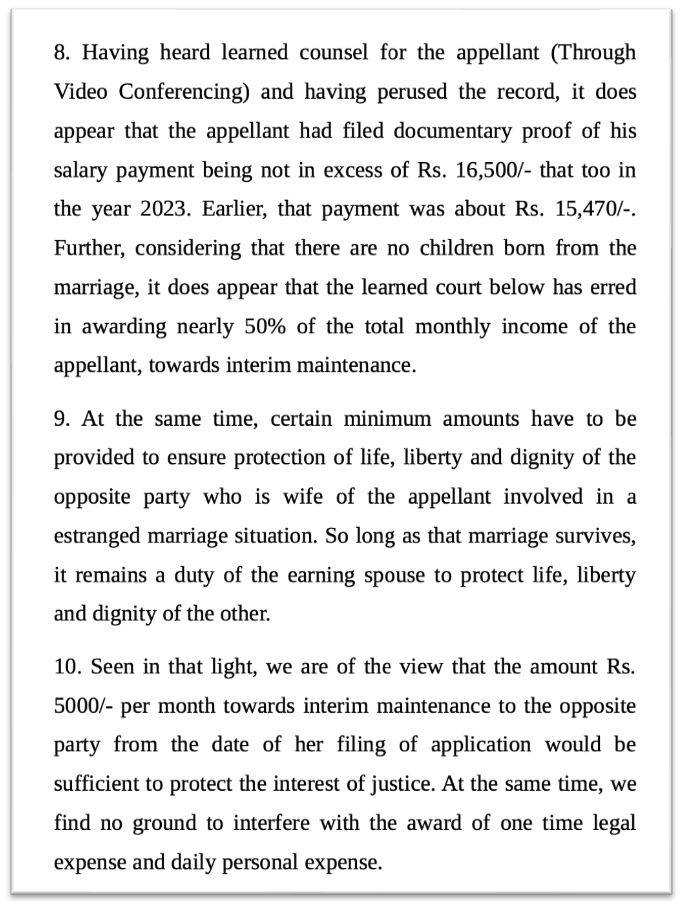
Delhi HC: Declines UPSC aspirant’s plea to appear in exam after she uploaded incorrect photo, signature in application form.
The Delhi High Court dismissed the plea of a UPSC aspirant to appear in the forthcoming Civil Services (Main) Examination after her candidature was cancelled for uploading an incorrect photograph and signature in the application form.
As per the details of the case Dikshika Meena vs. Union Public Service Commission & ors, the petitioner who has cleared the Preliminary Examination, claimed she had inadvertently uploaded her brother’s photo and signature in her application form. She challenged the cancellation of her candidature before the Central Administrative Tribunal (CAT). She sought an interim relief to be permitted to appear in the Main Examination, which was rejected by the tribunal.
Delhi High Court upheld the order of the tribunal and observed that the candidates have a window of seven days from the closure of the application window, to correct any error which had crept in the application form. However, the petitioner had not availed the said opportunity. The court further noted that the petitioner had approached the tribunal after almost a period of 15 days from the date of rejection of her candidature.
The court was informed that the petitioner has already been selected to the Indian Revenue Services, and thus has unlimited chances to appear in the Civil Services Examination. It was also informed that even if she did not appear for the upcoming Main examination, she is not prevented from appearing in the Civil Services Examination next year.
UPSC submitted that the candidates are required to preview the application form before they uploaded it, and it was only after confirmation that they were required to upload it. Furthermore, the petitioner also had the opportunity to correct the application within a period of seven days. Since the petitioner failed on these, there was no equitable relief that needed to be granted in her favour.
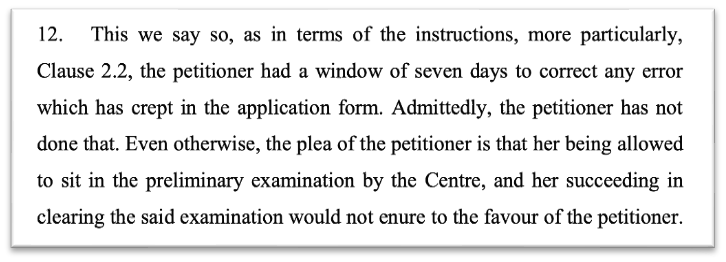
UPSC claimed that from around six lakh candidates that had appeared in the preliminary examination, around ten applications had been rejected on the grounds of mismatch of photographs and signatures. Therefore, it submitted that any order in favour of the petitioner would be in violation of Article 14 of the Constitution of India as the petitioner cannot be given a benefit that was denied to other candidates.
The commission also submitted that the centre allowing the petitioner to sit in the preliminary examination on the undertaking given by her was totally unauthorised.
The Court accordingly dismissed the writ petition, upholding the order of the Tribunal.
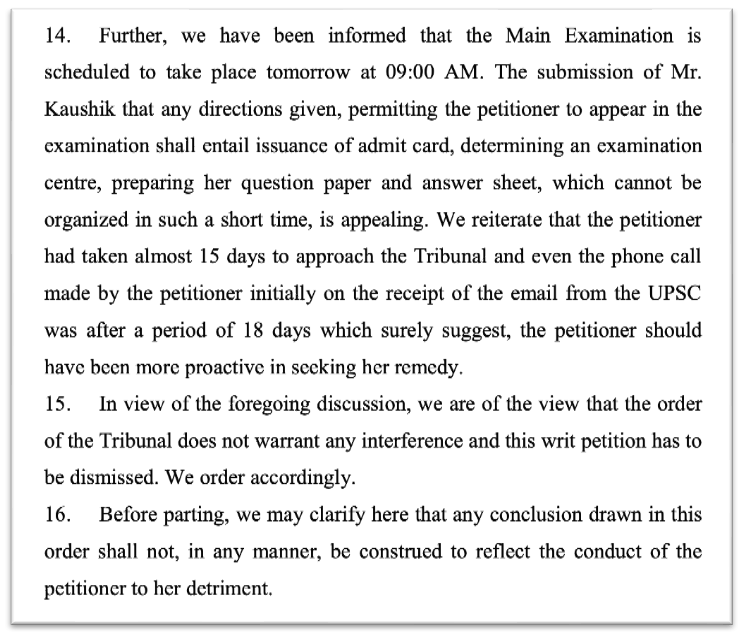
Kerala HC: Legal presumption/assessment of death is must for issue of legal heirship certificate to the Kin of man missing
As per the details of the case Suseela & Ors vs. State of Kerala & Ors, a person by the name Rajendran went missing on 20 June 2022. The petition was filed by his wife and daughters, who stated that although FIR was registered by their relatives, there has been no headway in finding the missing person. Therefore, they have submitted their cases that the appropriate authorities were obligated to grant them the Certificate of Legal Heirship without insisting on a ‘Man Missing Certificate’.
However, the Government defending the case argued that as long as there was nothing concrete that Rajendran was missing and that he was perhaps not alive, the Legal Heirship Certificate sought by the petitioners cannot be granted. They also informed the court that, no FIR has been submitted, as claimed by the petitioners.
Justice Devan Ramachandran hearing the case observed that a Legal Heirship Certificate could only be granted if there is a legally sanctioned presumption possible, or if it is factually assessed that the missing person is no more. Based on the presented facts of the case, the court said that there is the possibility of the missing person being alive somewhere without the capacity to contact the petitioners.
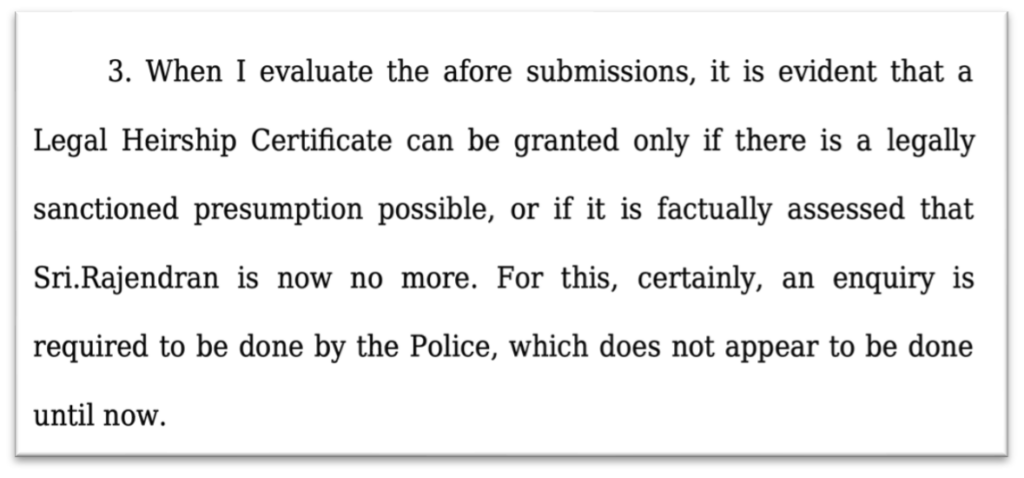
The petitioners were thus directed to register an FIR with the jurisdictional Police Station regarding the missing of Rajendran within a period of ten days. The police were directed to complete the investigation in this regard within a period of one month.
The Court further ordered that on completion of the Police enquiry and on the basis of the report by the Police, the petitioners can approach the Tahsildar for issuance of a Legal Heirship Certificate, which shall be considered and issued to them if they are found to be entitled, within a period of one month from the date on which such request is made.
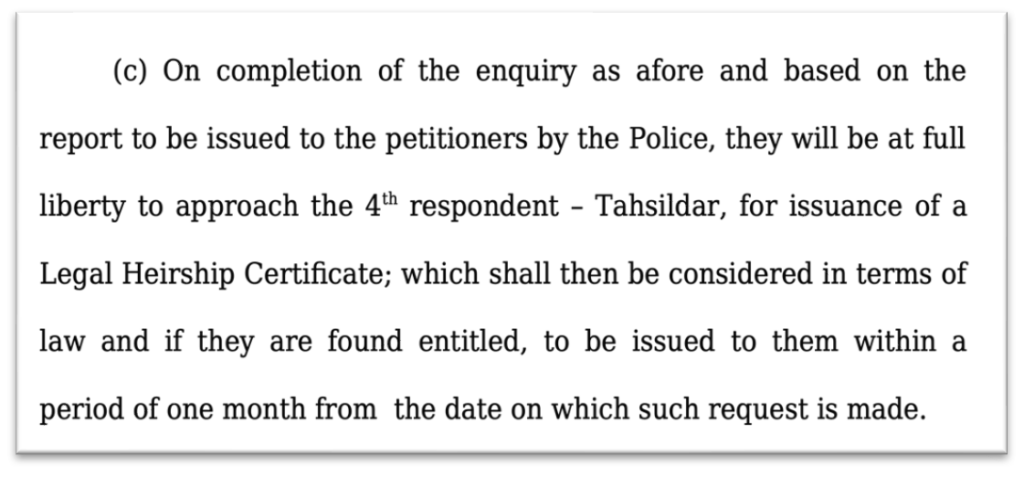
Chhattisgarh HC: Mental cruelty to wife if husband instead of discharging family obligations indulges in excessive drinking habit.
The two-judge bench of Chhattisgarh High Court consisting of Justice Goutam Bhaduri and Justice Sanjay S. Agarwal, observed that if a husband indulges in excessive drinking habit and does not discharge his family obligations, as a result of which the family condition deteriorates, then it can be construed as mental cruelty to the wife and the entire family.
An appeal was filed by the wife, challenging the Family Court’s order rejecting her application seeking divorce on the grounds of cruelty.
As per the details of the case, the couple got married in February 2006, and have one son and daughter, out of their wedlock. When the son was of the age 10 years old and the daughter 13 years old, the wife filed a petition before the family court seeking divorce on the grounds of excessive drinking habits of the husband.
She submitted that her husband used to beat her and sell the household goods due to his habit of excessive drinking. This has resulted in the deterioration of family conditions. In May 2016, she was assaulted and abused in an intoxicated state by her husband and therefore was forced to live along with her two children at her parental home.
There was also an earlier application filed by her seeking divorce on similar grounds. However, during the proceedings, the husband promised that he would leave the drinking habit and mend his behaviour prompting her to withdraw her petition. However, there was no change in the attitude of the husband.
The husband did not appear in front of the Family Court and not for the proceedings in the High Court. However, a written statement was sent denying the allegations. In the statement, he further contended that he is staying apart because of the behaviour of his wife and that she used to extend threats and mental cruelty to him.
The court considered the statements provided by the wife and noted that many allegations of cruelty arose because of the excessive drinking habits of the husband. Since there was no cross-examination done in regard to the facts, the court would accept the statements made by the wife and deemed to be accepted by the husband.
The Court held that the husband had caused mental cruelty to the wife and as such, she was entitled to a decree of divorce. Therefore, the HC dissolved the marriage by granting a decree of divorce in favour of the wife. In regards to alimony, the court noted that if the husband has sufficient means, he is obligated to maintain his wife and children, held that the wife would be entitled to get Rs.15,000/- per month from the appellant/husband towards maintenance, which would be deducted at source from the salary of the appellant, if any received by the husband, or otherwise the amount would be treated to be a charge over the property held by the husband.
